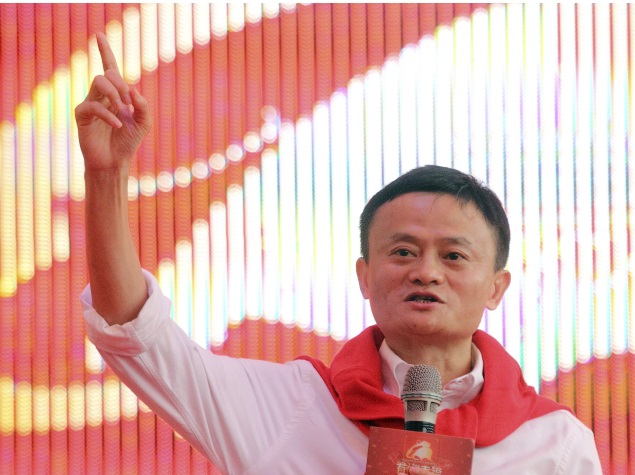- Home
- Internet
- Internet Features
- Alibaba and Wanda Face Off: Online and Offline
Alibaba and Wanda Face Off: Online and Offline

But while Wang says he laid the wager "for fun" two years ago, the billionaires' business interests are increasingly converging as Chinese consumers' spending habits undergo a seismic shift and much larger sums are at stake.
China has the world's biggest population of Internet users, with annual online sales jumping 41 percent in 2013. However, that figure represents a paltry 7.8 percent of overall retail sales, leaving plenty of room for growth.
Zhuo Saijun, a Beijing-based analyst with Analysys International, told AFP consumers were increasingly going online to purchase "in the easiest and most convenient way".
"If an online platform has more advantages in terms of cost performance and information retrieval, consumers will definitely be more inclined towards online," he said.
The e-commerce explosion contrasts with the slowdown of retail sales as a whole, a palpable trend even before the luxury market was hit by party cadres curbing excessive spending in response to President Xi Xinping's anti-corruption drive.
Property developers, already saddled with excess commercial space, are spooked.
Half the world's shopping mall projects underway are in China. Among them is northeastern Shenyang city, which has 28 megamalls for six million people.
The spread of malls has accelerated under pressure from local governments, with Chinese cities taking nine of the top ten spots in the world last year by amount of newly constructed retail space, US consultancy CBRE says.
Occupancy varies according to location, with some never empty while others in the farther reaches struggle to attract repeat customers.
Typically marrying an array of clothing and cosmetic franchises with fast-food courts and coffee outlets, some become "phantom malls", filled with little more than an incessant soundtrack of syrupy muzak.
'Between a rock and hard place'
K.K. Fung, managing director for Greater China at real estate investment firm Jones Lang LaSalle believes larger cities can absorb the construction of yet more malls as migrants flock to the likes of Beijing and Shanghai.
However provincial capitals such as Chengdu, in the southwest, "will suffer", he cautioned. National supply will double between 2013 and 2016 but five percent of shopping centres are empty or have a high level of store vacancies.
"Some developers made promises to governments, they are caught between a rock and a hard place," he added.
These malls represent the next retail frontier for China.
While Wang built his name with Wanda, a commercial property conglomerate that owns hotels, cinema megaplexes and shopping malls, Ma's rise came on the success of upstart e-commerce businesses under the Alibaba group.
Alibaba's Taobao is now estimated to hold more than 90 percent of the online consumer-to-consumer Chinese market, with over 800 million product listings and around 500 million registered users.
Seeing opportunities to consolidate strengths on the other's turf, Wang and Ma's once-distinct portfolios have now blurred.
Alibaba group invested $692 million in Chinese department store operator InTime in March, and Wang joined forces with tech giants Tencent and Baidu in August to set up an e-commerce platform costing more than $800 million.
Wang and Ma are both seeking to capitalise on Chinese smartphone use to push users into physical stores with extra benefits once inside a process known as "online to offline" retail.
Alibaba and Intime say they will expand an agreement allowing shoppers to purchase items instore with the Alipay app, and provide targeted promotions and membership benefits when connected to instore Wi-Fi and location-based technology.
Wanda, Tencent and Baidu will share a user membership system, synchronise customer data and offer the same Wi-Fi network across all Wanda's 107 malls, according to the Financial Times.
A series of as yet-unannounced "innovative online financial products" is also in the pipeline, Wanda says.
However, Alibaba will be loath to lose business from its core platforms and has invested as much recently in logistics and postal services as in physical retail.
It has good reason not to stray too far from its tech roots. Last week Ma became China's richest person pushing Wang into second place following Alibaba's record initial public offering in New York.
But whoever wins the bet, Alibaba has changed Chinese retail forever, says Fung.
"To some extent, Alibaba cultivated the online shopping habits of Chinese consumers. It cultivated China's lower-end consumers, as well as medium and small enterprises.
"This is the most valuable and meaningful thing it has done... developing a complete system that consists of e-commerce culture, management and marketing as well as services based on all that."
Catch the latest from the Consumer Electronics Show on Gadgets 360, at our CES 2026 hub.
Related Stories
- Samsung Galaxy Unpacked 2025
- ChatGPT
- Redmi Note 14 Pro+
- iPhone 16
- Apple Vision Pro
- Oneplus 12
- OnePlus Nord CE 3 Lite 5G
- iPhone 13
- Xiaomi 14 Pro
- Oppo Find N3
- Tecno Spark Go (2023)
- Realme V30
- Best Phones Under 25000
- Samsung Galaxy S24 Series
- Cryptocurrency
- iQoo 12
- Samsung Galaxy S24 Ultra
- Giottus
- Samsung Galaxy Z Flip 5
- Apple 'Scary Fast'
- Housefull 5
- GoPro Hero 12 Black Review
- Invincible Season 2
- JioGlass
- HD Ready TV
- Laptop Under 50000
- Smartwatch Under 10000
- Latest Mobile Phones
- Compare Phones
- Samsung Galaxy A07 5G
- Vivo Y500i
- OnePlus Turbo 6V
- OnePlus Turbo 6
- Itel Zeno 20 Max
- OPPO Reno 15 Pro Mini 5G
- Poco M8 Pro 5G
- Motorola Signature
- Lenovo Yoga Slim 7x (2025)
- Lenovo Yoga Slim 7a
- Realme Pad 3
- OPPO Pad Air 5
- NoiseFit Pro 6R
- Xiaomi Watch 5
- Acerpure Nitro Z Series 100-inch QLED TV
- Samsung 43 Inch LED Ultra HD (4K) Smart TV (UA43UE81AFULXL)
- Asus ROG Ally
- Nintendo Switch Lite
- Haier 1.6 Ton 5 Star Inverter Split AC (HSU19G-MZAID5BN-INV)
- Haier 1.6 Ton 5 Star Inverter Split AC (HSU19G-MZAIM5BN-INV)

















